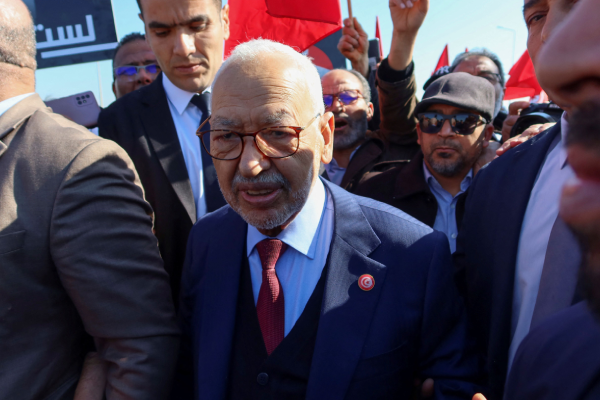Rached Ghannouchi, the opposition Ennahdha Party’s leader, was sentenced to 14 years in prison on Tuesday on charges of “conspiracy against state security” and “belonging to a terrorist group,” according to Tunisia’s state-run media, Tunis Afrique Presse
The Tunis First Instance Court’s criminal chamber for terrorism-related crimes rendered the verdict.
Along with Ghannouchi, the court sentenced several former officials and political figures to 12 years in prison, including former intelligence chief Mahrez Zouari, former head of aircraft security at Tunis-Carthage International Airport Abdelkarim Abidi, senior Ennahda official Habib Ellouze, and Rayan Hamzaoui, mayor of Ezzahra in Ben Arous province.
In addition, the court handed down 35-year prison terms to several individuals currently at large, including former presidential chief of staff Nadia Akacha, Ghannouchi’s son Moaz Ghannouchi and Ennahda officials Adel Daadaa and Rafik Abdessalem.
The indictment chamber had referred the case to trial on May 15, 2024. Hearings began on May 2, 2025 and were postponed several times before the court set July 8 as the date to deliver its rulings.
Around 20 Tunisians are facing charges in the case, including “forming a terrorist group, conspiracy against internal state security, terrorism financing, money laundering, attempting to overthrow the government and using social media to incite violence.”
Several human rights organisations and opposition groups have criticised the case, calling it “politically motivated” and part of a broader effort “to silence critics of President Kais Saied and his exceptional measures.”
Tunisian authorities have frequently denied prosecuting individuals for political reasons, claiming that all defendants face criminal allegations such as “conspiracy against state security” or “corruption.”
On July 25, 2021, President Saied launched a series of exceptional steps, including dismissing the judiciary and parliament, ruling by decree, proposing a new constitution by referendum, and holding early legislative elections.
While some political parties have labeled these actions as a “coup that entrenched authoritarian rule,” others say that they are “a course correction following the 2011 revolution” that deposed former President Zine El Abidine Ben Ali.
The verdicts on Tuesday come after a similar case in which 40 defendants were sentenced to prison terms ranging from four to 66 years on April 19, penalties that the opposition also challenged.





